Winter months present additional hazards that are typically not factors for employees during warmer weather – specifically, slip and fall concerns. With snow and ice-covered conditions, you run the risk of taking major falls, which can lead to serious injuries.
Prevention
Education is essential in preventing winter weather-related injuries. Consider the following recommendations to prevent slip and fall injuries during the winter months:
- Wear the proper footwear that provides traction on snow and ice. Footwear should be made of anti-slip material; avoid plastic and leather-soled shoes or boots.
- Exercise caution when entering and exiting vehicles, and use the vehicle for balance and support.
- Try to walk only in designated areas that are safe for foot traffic. If you notice that a walkway is covered in ice, walk on the grass next to the sidewalk, which will have more traction.
- Avoid inclines that are typically difficult to walk up or down as they may be more treacherous in winter conditions.
- Take small steps to maintain your center of balance, walk slowly, and never run. When possible, walk with your hands-free to maintain your balance. And despite the cold temperatures, avoid putting your hands in your pockets. This will help you better maintain your balance and allow you to break a fall should you slip.
- Use handrails, walls, or anything stationary to assist in steadying your feet.
- Look ahead to the path in front of you to avoid hazards.
- Test a potentially slippery area before stepping on it by tapping your foot on the surface first.
- Remove debris, water, and ice from all working walkways.
- Steer clear of roof edges, floor openings, and other drop-offs to avoid slipping hazards.
- Sand or salt surfaces are covered by ice or snow to provide traction.
- Dry your shoes or boots on floor mats when entering a building.
- Report trip and fall hazards immediately to your supervisor.
- Seek shelter immediately in the event of severe weather conditions.
If You Begin to Slip…
- Twist your body and roll backward to avoid falling forward and injuring your face.
- Try to relax your body when you start to feel your legs give way.
- If you are carrying a load, throw it off to the side so it does not land on you when you fall. This will also free your arms to help break your fall.

